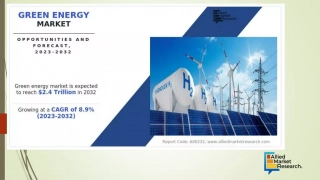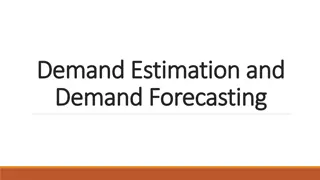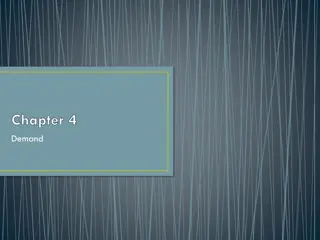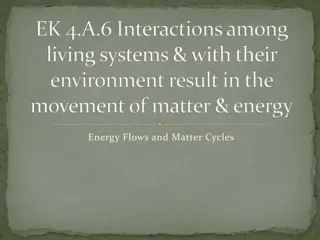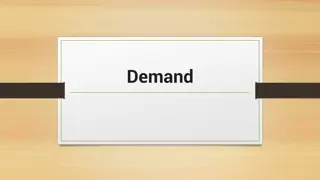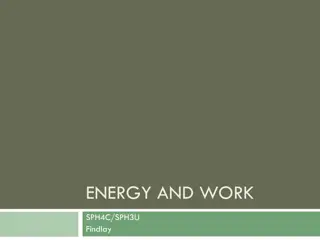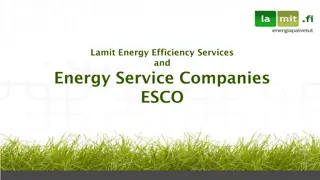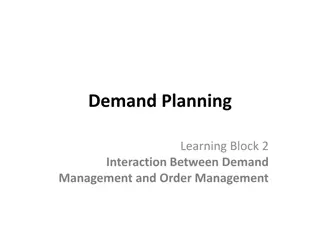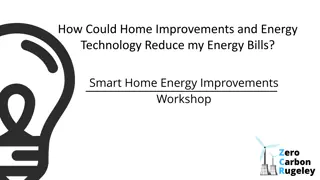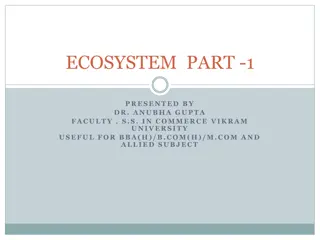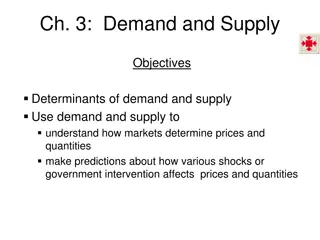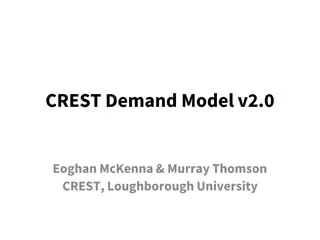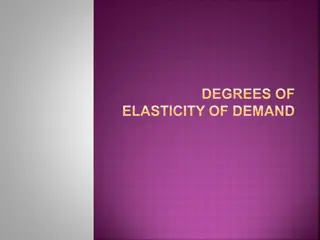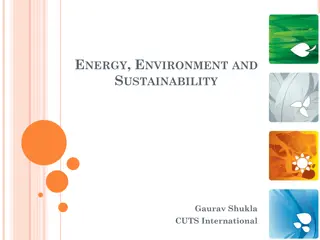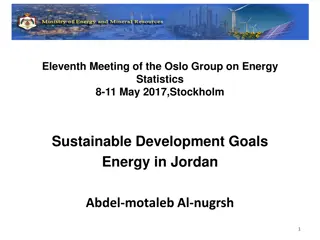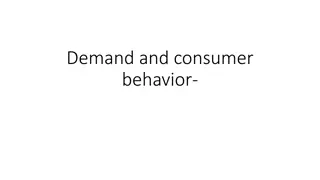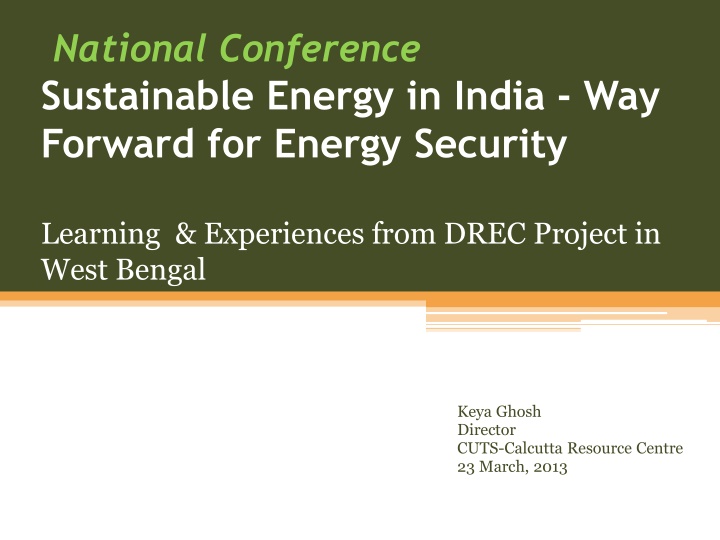
Sustainable Energy in India - Empowering Consumers for Demand Management and Renewable Energy Initiatives
To address the growing energy demand in India, a project focusing on demand side management and renewable energy has been undertaken. The objectives include increasing consumer awareness, understanding willingness to pay for renewables, and identifying barriers to implementation. Initiatives are being carried out in select districts of West Bengal to promote responsible and sustainable energy practices.
Download Presentation

Please find below an Image/Link to download the presentation.
The content on the website is provided AS IS for your information and personal use only. It may not be sold, licensed, or shared on other websites without obtaining consent from the author. If you encounter any issues during the download, it is possible that the publisher has removed the file from their server.
You are allowed to download the files provided on this website for personal or commercial use, subject to the condition that they are used lawfully. All files are the property of their respective owners.
The content on the website is provided AS IS for your information and personal use only. It may not be sold, licensed, or shared on other websites without obtaining consent from the author.
E N D
Presentation Transcript
National Conference Sustainable Energy in India - Way Forward for Energy Security Learning & Experiences from DREC Project in West Bengal Keya Ghosh Director CUTS-Calcutta Resource Centre 23 March, 2013
2 Rationale for undertaking the Project To maintain the growth trajectory, India must meet the increasing demand for energy. For responsible and sustainable growth---- focus on demand side management (DSM) and renewable energy (RE), is a must. Currently, there is underutilization of both RE and DSM potential. Without active and initiative can be successful. robust participation of Consumers , no DSM or RE Mitigating energy shortages, encouraging energy efficiency at demand end, improving utility revenues or creating markets for RE technology ---all require participation of consumers as an important STAKEHOLDR. Hence this project
3 Project Objectives Overall Objective To increase long-term capacity/awareness of consumer groups to demand for DSM and RE initiatives, and also to understand, document and communicate their specific needs to relevant policy makers. Specific Objectives To gauge the level of awareness among various stakeholders on RE and DSM To understand consumers willingness to pay for RE To understand the various roadblocks to effective implementation of initiatives pertaining to RE and DSM
4 Some Details .. Territoriesin West Bengal Criteria for Choosing Districts Namkhana Gosaba Patharpratima Mathurapur Sunderbans Parganas) ---- where RE initiatives undertaken (South 24 have been Tamluk Contai East Midnapore & Nadia - Grid Connected and Hence higher relevance of DSM Duttaphulia Chapra Cooch Behar - isolated islands and hence higher relevance for RE initiative CoochBehar Haldibari
5 Project Activities As per Project Proposal Other Demand Driven Activities Inception Workshop Focused Group Discussions with select stakeholders Baseline Survey RG Meeting Developing a Training Manual for CSOs and Consumers in Bangla State Level Training Workshop CIMs were made stakeholder specific (household, CSOs, commercial, and agriculture) Consumer Interface Meeting CIM)--20 4 Case Studies State Level Advocacy Workshop ( Critical Analysis of the RE Policy of WB) Study on Diesel Operators Dissemination and Dialogue Meeting for CSOs with NABARD and WBREDA Final Consumer Survey
6 Major Findings and Learning from DREC In West Bengal need for DSM Policy and regulations In off-grid generation-----the loose ended regulations made at the local level is insufficient; need for more structured regulations; metering facility should be introduced. Community participation and ownership---another crucial factor in ensuring sustainability of RE projects
7 Consumers willing to pay extra ( 1-5%) for RET. Hurdles in greater uptake of RET-- high investment costs; lack of enough knowledge about maintenance; hence the perception that solar or RET is not reliable; and limited after-sale service CSOs can play a greater role in promoting uptake of RE and DSM. Need for a sustained role of CSOs. Great scope for promoting RE and DSM in agriculture sector---Solar pump sets and EE pump sets
8 OUTCOMES OF THE PROJECT
Project Objectives Degree of Association with relevant Institutions under DREC Project Outcomes 9 CUTS-CRC appointed as member of the Solar PV committee for the New Town , Kolkata which is designated to become a Solar City. Has become a member of the Electricity Regulatory Commission in West Bengal. Expected Practice Change: Consumer groups and representative bodies invited regulatory agencies to take part in deliberations other STRONG Ram Krishna Lok Seva Kendra (RLSK), DREC partner in Gosaba has been assigned the responsibility of generating, distributing and collecting electricity bill for the residents in Gosaba. In doing so RLSK will involve people who used to work at the biomass gassifier plant but had lost their jobs after conventional grid reached the island. will by be the their
Objectives Association with relevant Institutions under DREC Project 10 CUTS CRC together with eight of their district partners submitted (joint submission) their comments and suggestions on the following draft regulations published by WBERC Expected Practice Change - Consumer Groups will participate in the regulatory mechanism Terms and conditions of Tariff (Amendment) Regulations, 2012 ; Cogeneration & Generation of Electricity from Renewable Sources of Energy ; "Draft West Bengal Electricity Regulatory Commission (Miscellaneous Provisions), Regulations, 2012"; "Draft West Bengal Electricity Regulatory Commission (Recovery of Expenditure for Providing New Connections) Regulations, 2012 . CUTS CRC together with CCIER and Viksat submitted comments on the Draft Policy under JNNSM II. STRONG
11 Project Objectives Degree of Association under Project Activities STRONG WBREC partnered CUTS in State Level Advocacy Workshop and WBREDA partnered CUTS in the Dialogue and Dissemination Meeting on Financial Schemes with NABARD Outcomes Alinan Ramakrishna Vivekananda Yuva Sangha (ARVYS), DREC partner in Tamluk submitted a letter to the District Magistrate (DM) of East Midnapore, expressing ARVYS s intent to organise a half day awareness programme on Energy Efficiency and Judicious Use of Electricity with officials at the DM s office. Expected Practice Change Consumer Groups will demand for specific interventions on DSM/RE. CUTS International submitted a memorandum to the relevant government departments and ministries to ensure effective implementation of the RE policy in West Bengal.
12 Outcomes Project Objectives Degree of Associatio n under Project Activities In the month of July, 2012 West Bengal formulated its RE policy. Though the policy does not spell out scope for community involvement, practice change has started happening. WBERC, WBREDA have partnered CUTS initiatives and started supporting CSO involvement.. Have welcomed the value added by them. Inclusion of CUTS in Solar City New Town is an evidence. Policy Change: Regulatory agencies will have a policy (refinement of that policy if already exist) to ensure better community participation in DSM/RE initiatives, including a policy to engage community groups to monitor the effectiveness of DSM/RE initiatives. Moderate WBREDA coming forward to partner the Dialogue Meeting was another evidence of practice change in Wet Bengal. Principal Secretary, Department of Power and Non Conventional Sources, GoWB, Mr M.K. Dey, Mr Gon Choudhury, Former Adviser to GoWB, have always been supportive and guided CUTS initiatives. However the DSM policy is yet to come..
13 Findings from the Final Consumer Survey Out of the 513 respondents who were interviewed during the baseline survey, a representative sample of 357 respondents were selected for the final consumer survey.
14 Findings Related to Renewable Energy How much extra amount would you prefer to pay over & above your present electricity bill for getting access to clean energy ? 72 percent of the respondents considered it wise to start using renewable technologies given the rate at which electricity tariff is increasing. 4% 13% 23% LESS THAN 1% 1% TO 5% 5% - 10% 10% - 20% They are also ready to pay extra for clean energy if it is reliable. (Figure left) Farmers - Do you think installing solar pumpset is worth investing and rewarding in the long run ? 60% 86 percent of the grid connected household believe that there is ample scope for using RE in their premises. 15% YES 85 percent of the farmers (both grid connected and off-grid, total 55), told that installing solar pump-set could be more rewarding in the long run. NO 85%
15 Findings Related to Renewable Energy .(contd.) K-Plot is a small un-electrified island in the Sunderbans delta. Commercial activities in the island are confined to 2 Rural Hats that the island has. There are a few diesel generator operators who supply electricity to these shops during the evening with an average monthly expenditure ranging between 250 1500 for the shops. Discussion with these units revealed that they are interested to shift to RE generated electricity provided an external agency puts up a mini solar grid ensuring reliability and sufficient availability and the shops don t have to pay much higher than what they are paying at present. A further study by CUTS involving 30 Diesel Generator Operators from the Sunderbans, Midnapur and Nadia revealed that the major hurdles towards shifting to RE/Solar based operations were: High Initial Investment Skepticism regarding the reliability of RE/Solar to supply sufficient energy as per requirement. Space constraints to set-up plant and also its easy portability Impending grid connectivity Lack of consensus amongst businessmen/ associations (Byabshayi Samiti) towards long term sustainability of the RE/Solar driven systems.
16 Findings Related to Energy Efficiency 93 percent of the respondents across all stakeholder categories are now aware about star label and its benefits. 78 percent of the farmers are aware about BEE labelled pumpsets and 66% felt it is worth investing in EE pumps. 63 percent of the farmers (grid connected) were found to be aware of ToD tariff system but only 47 percent were actually found taking benefits of the TOD metering system. A appreciable section of those surveyed said that they have shifted to energy efficient practices like using CFL, star labelled equipment, judiciously using energy, shifting to energy efficient pumps, etc.
17 DREC has set the stage Need for Concerted and Sustained Efforts A Cadre of Capacitated CSOs have been created who have expressed interest in doing more work related to RE/DSM. Agragati, a CSO from Howrah district, has already written a letter to the concerned authority at the Block level seeking funding support from the government to undertake awareness programmes on RE and EE in their locality. RamkrishnaLokSeva Kendra (RLSK), participated in a discussion on chalking out the annual budget for the Gosaba Block (in South 24 Parganas). Till now there was no budget allocation for non-conventional energy sources. This year in the meeting of the panchayat samity, RLSK strongly advocated for allocating financial resources for it and it was principally agreed upon.
18 Representative from a CSO - Cooch Behar Progressive Welfare Society (CBPWS), together with a local puja committee published key messages of the DREC project on the back side of the bill that were given to the community members against subscription for the Durga Puja.
19 CHALLENGES in the path .. Towards greater uptake of RE Lack of information among consumers about existing financial schemes for RET, about basic technology related information to ensure optimum functioning of solar equipments; procurement methods, etc.---- so need for sustained efforts by CSOs. To bring about change in consumer perception that RE technology is unviable and unsustainable. Strengthen after-sale service and train local youth in repair and maintenance of RET/ EEA. Link consumers to the right sources. ENERGY(CLEAN) SOLUTION CENTRES FOR CONSUMERS---could be a way forward. To institutionalise the platform created by DREC so that the efforts continue much beyond the scope of the project. .
20 Enhance Efficiency of RET. Regulations for Off-grid generation with community participation/ ownership models Participatory and concerted approach of all stakeholders towards finding solution , as has been initiated in West Bengal.
21 THANK YOU ( kg@cuts.org)

